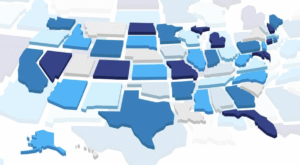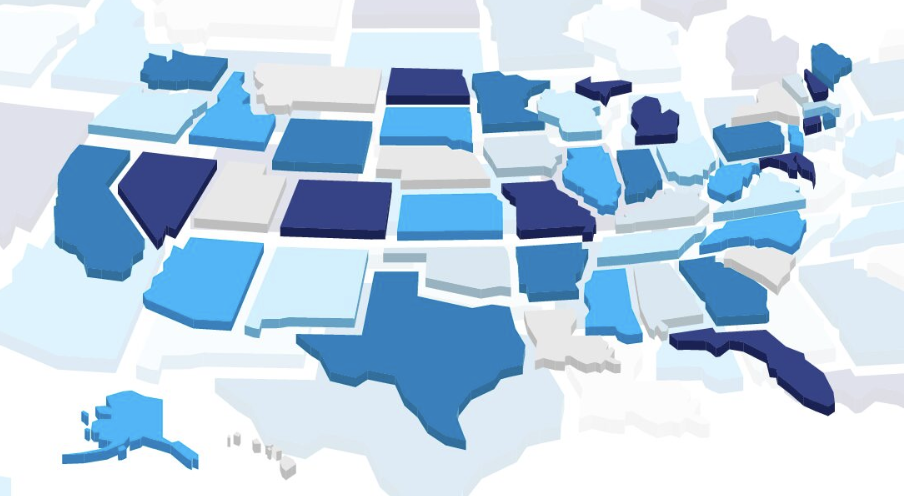Across the United States, evolving data collection and processing practices are driving digital services and socially beneficial research, but also pose increasing risks to individuals and communities that America’s existing sectoral privacy frameworks are insufficient to govern. In response, leaders in law and policy are considering more comprehensive approaches to privacy regulation, which establish baseline rights and protections for personal data throughout the economy. Years of negotiations in Congress culminated in the introduction of the bipartisan American Data Privacy and Protection Act in 2022; however, its fate remains uncertain. In the absence of federal legislation, five U.S. states—California, Virginia, Colorado, Utah, and Connecticut— enacted comprehensive consumer privacy laws between 2018-2022.
The Future of Privacy Forum provides expert, independent analysis of legislative and regulatory approaches to protecting data privacy interests. FPF does not typically support or oppose particular bills, but instead focuses on analyzing proposals in relation to existing privacy frameworks, sharing information on current data practices and technologies, and ensuring that data governance strategies are future-looking and adaptable.
FPF also engages with the broader privacy community through reports, blog posts, webinars, and educational programs such as the CPRA Law + Tech Series. It is our view that robust and durable policy outcomes can be achieved when all stakeholders are equipped to understand the key technologies, business practices, and legal mechanisms available to regulate privacy and data protection. FPF’s legislation work is led by Tatiana Rice, Senior Director.
Featured
Q&A With FPF Vice President for U.S. Policy, Matthew Reisman
In a new Q&A, our new Vice President for U.S. Policy, Matthew Reisman, takes a deeper look at the privacy landscape, particularly his interests in the space, what to look forward to in the U.S. and AI sector, and what is key for stakeholders to pay attention to. What brought you into the privacy and […]
From Proposal to Passage: Enacted U.S. AI Laws, 2023–2025
Over the past three years, lawmakers across the United States have increasingly enacted AI-related laws that shape the development and deployment of AI systems. Between 2023 and 2025, the Future of Privacy Forum tracked 27 pieces of enacted AI-related legislation across 14 states, along with one federal law (the TAKE IT DOWN Act) that carry […]
Paradigm Shift in the Palmetto State: A New Approach to Online Protection-by-Design
SSouth Carolina Governor McMaster signed HB 3431, an Age-Appropriate Design Code (AADC) -style law, on February 5, adding to the growing list of new, bipartisan state frameworks fortifying online protections for minors. Although HB 3431 is dubbed an AADC, its divergence from past models and unique blend of requirements that draw upon a variety of […]
FPF Retrospective: U.S. Privacy Enforcement in 2025
The U.S. privacy law landscape continues to mature as new laws go into effect, cure periods expire, and regulators interpret the law through enforcement actions and guidance. State attorneys general and the Federal Trade Commission act as the country’s de facto privacy regulators, regularly bringing enforcement actions under legal authorities both old and new. For […]
Future of Privacy Forum to Honor Top Scholarship at Annual Privacy Papers for Policymakers Event
Washington D.C. — (January 26th, 2026) — Today, the Future of Privacy Forum (FPF) — a global non-profit that advances principled and pragmatic data protection, AI, and digital governance practices — announced the winners of its 16th annual Privacy Papers for Policymakers (PPPM) Awards. The PPPM Awards recognize leading research and analytical scholarship in privacy […]
The RAISE Act vs. SB 53: A Tale of Two Frontier AI Laws
What the enactment of New York’s RAISE Act reveals compared to California’s SB 53, the nation’s first frontier AI law On December 19, New York Governor Hochul (D) signed the Responsible AI Safety and Education (RAISE) Act, ending months of uncertainty after the bill passed the legislature in June and making New York the second […]
FPF Year in Review 2025
Co-authored by FPF Communications Intern Celeste Valentino with contributions from FPF Global Communications Manager Joana Bala This year, FPF continued to broaden its footprint across priority areas of data governance, further expanding activities across a range of cross-sector topics, including AI, Youth, Conflict of Laws, AgeTech (seniors), and Cyber-Security. We have engaged extensively at the local […]
Five Big Questions (and Zero Predictions) for the U.S. Privacy and AI Landscape in 2026
Introduction For better or worse, the U.S. is heading into 2026 under a familiar backdrop: no comprehensive federal privacy law, plenty of federal rumblings, and state legislators showing no signs of slowing down. What has changed is just how intertwined privacy, youth, and AI policy debates have become, whether the issue is sensitive data, data-driven […]
FPF Releases Updated Report on the State Comprehensive Privacy Law Landscape
The state privacy landscape continues to evolve year-to-year. Although no new comprehensive privacy laws were enacted in 2025, nine states amended their existing laws and regulators increased enforcement activity, providing further clarity (and new questions) about the meaning of the law. Today FPF is releasing its second annual report on the state comprehensive privacy law […]
What’s New in COPPA 2.0? A Summary of the Proposed Changes
On November 25th, U.S. House Energy and Commerce introduced a comprehensive bill package to advance child online privacy and safety, which included its own version of the Children and Teens’ Online Privacy Protection Act (“COPPA 2.0”) to modernize COPPA. First enacted in 1998, the Children’s Online Privacy Protection Act (COPPA) is a federal law that […]
















